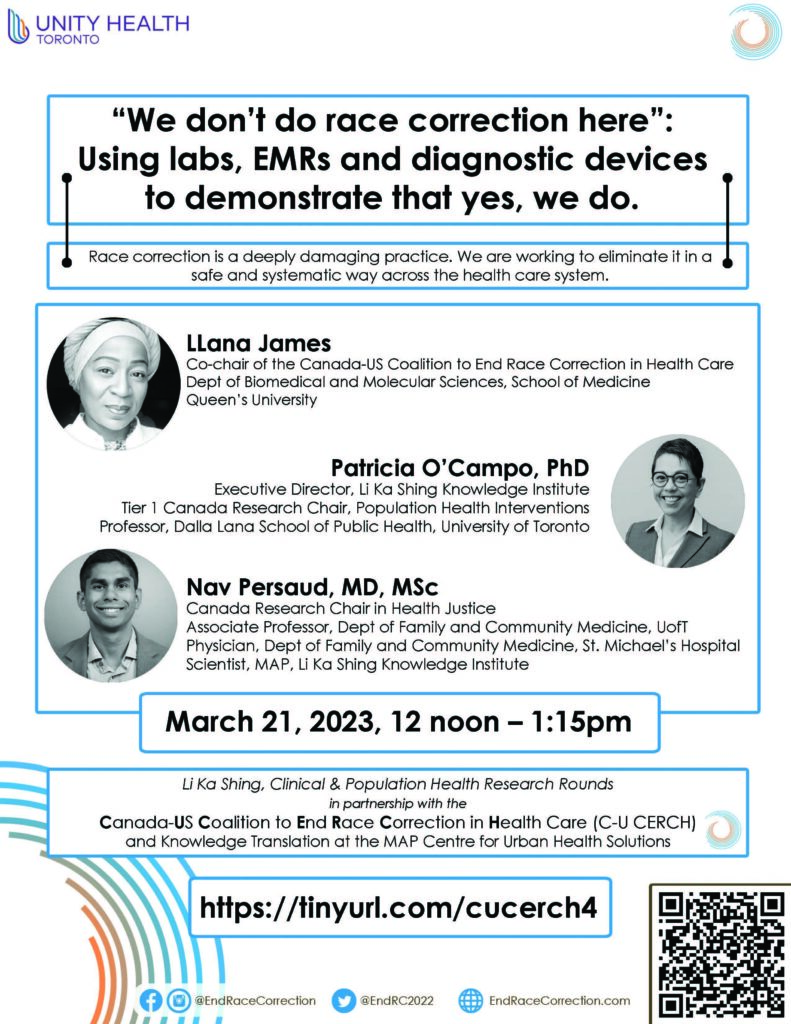Li Ka Shing, Clinical and Population Research Rounds, 2023
Ending the Practice of “Race Correction” in Health Care speaker series as part of the Li Ka Shing, Clinical and Population Research Rounds, 2023
Presented by Dr. Patricia O’Campo, Executive Director of the Li Ka Shing Knowledge Institute at Unity Health Toronto, in partnership with the Canada-US Coalition to End Race Correction in Health Care and Knowledge Translation at the MAP Centre for Urban Health Solutions.
Date and Time (virtual event): March 21, 2023 from 12 pm – 1:15 pm EST
Video Recording: Please visit https://www.endracecorrection.com/media/ for a video recording of the talk.
Interview on CBC’s The Current with Matt Galloway: https://www.cbc.ca/listen/live-radio/1-63-the-current/clip/15974700-calls-end-race-correction-health-care
About this talk: Individual clinicians or departments have initiated efforts to eliminate some forms of race correction. But all of us are enmeshed in a broader health care system where race correction shows up at multiple points in a Black person’s clinical journey in Canada. We will review lab requisitions (from public and private labs), EMRs and diagnostic devices that demonstrate how race correction is practiced in hospitals and clinics here and now. We will also discuss how to eliminate this deeply damaging practice in a safe and systematic way across the health care system.
This event marks the anniversary of the launch of the Canada-US Coalition to End Race Correction in Health Care. It is timed to coincide with the United Nations Week of Solidarity with the Peoples Struggling against Racial Discrimination, which includes the International Day for the Elimination of Racial Discrimination (March 21), the International Day for the Right to the Truth concerning Gross Human Rights Violations and for the Dignity of Victims (March 24), and the International Day of Remembrance of the Victims of Slavery and the Transatlantic Slave Trade (March 25).
What is “race correction”? Health care providers often use tests to assess a patient’s health. In many cases, health care providers calculate test results differently for Black patients than they do for everyone else. Overall, “race correction” means that Black people are diagnosed late, or never diagnosed at all, for serious conditions from heart, kidney and lung diseases to cognitive impairment. It also means that Black people are systematically excluded from timely access to life-saving treatments like organ transplants and other surgeries. “Race correction” has no scientific basis because “race” is not biological. It is a social construct that is applied differently in different times and in different places. In fact, scientists have shown us that people have more in common genetically across “racial” groups than within them.

Speaker bios:
LLana James
Queen’s University
Dept of Biomedical and Molecular Sciences, School of Medicine
Co-chair of the Canada-US Coalition to End Race Correction in HealthCare
LLana James’ research illuminates how technology can undermine or bolster human rights in the context of clinical care, rehabilitation science and public health. Her interdisciplinary and applied approach is designed to critically appraise current applications of technology while developing and implementing interventions that seed new, ethical futures. To accomplish this, LLana brings together academic and community scholars across disciplines and sectors to work at the intersections of medicine/clinical care, public health, data, AI, law, and race-ethnicity across multiple axes, e.g., gender, class, able-bodiedness. As a result of her ground-breaking work, she is the inaugural AI, Medicine and Data Justice Post-Doctoral Fellow at Queen’s University.
Patricia O’Campo, PhD
Executive Director, Li Ka Shing Knowledge Institute
Tier 1 Canada Research Chair, Population Health Interventions
Professor, Dalla Lana School of Public Health, University of Toronto
Dr. O’Campo is Canada Research Chair in Population Health Intervention Research and Professor at the Dalla Lana School of Public Health at the University of Toronto. Dr. O’Campo is an internationally renowned public health scholar who has an active research program that focuses on understanding the health impacts of complex urban social problems experienced by low-income populations. Through her scholarship over the past 25 years, dedicated partnerships with affected communities, and academic leadership for over fifteen years, she has generated strong evidence around interventions to improve the lives of those living with multiple health, social and economic challenges. She has been widely recognized for her contributions to population well-being through the receipt of early, mid- and late-career awards given by national and international organizations such as the US Centers for Disease Control, American Academy of Pediatrics, American Public Health Association, US Institute of Medicine and the Royal Society of Canada.
Nav Persaud, MD, MSc
Canada Research Chair in Health Justice
Associate Professor, Dept of Family and Community Medicine, University of Toronto
Physician, Dept of Family and Community Medicine, St. Michael’s Hospital
Scientist, MAP, Li Ka Shing Knowledge Institute
Dr. Nav Persaud is the Canada Research Chair in Health Justice, Staff Physician in the Department of Family and Community Medicine at St. Michael’s Hospital in Unity Health Toronto, and Associate Professor in the Department of Family and Community Medicine at the University of Toronto.
His research focuses on health equity or fairness, especially as it related to medicine access (cleanmeds.ca). He also compares national essential medicines lists in collaboration with the World Health Organization (essentialmeds.org).
Note: Sign language interpreters (ASL) will be signing during the event.
For any questions please contact LKSKIResearch@unityhealth.to
Below please find important background materials: